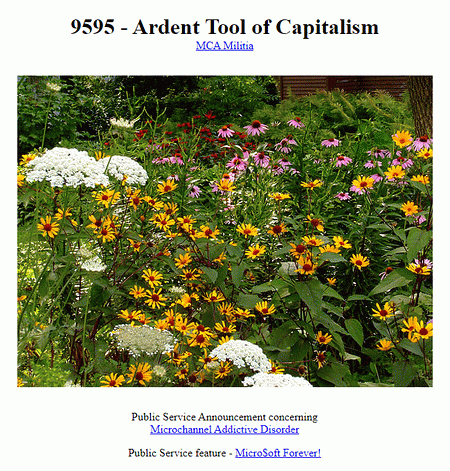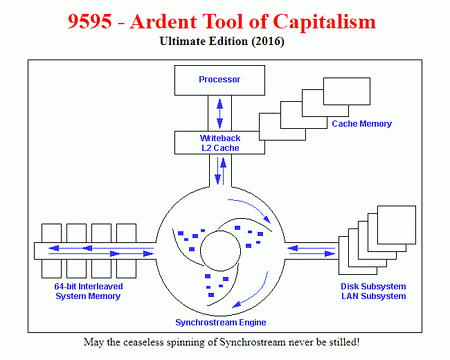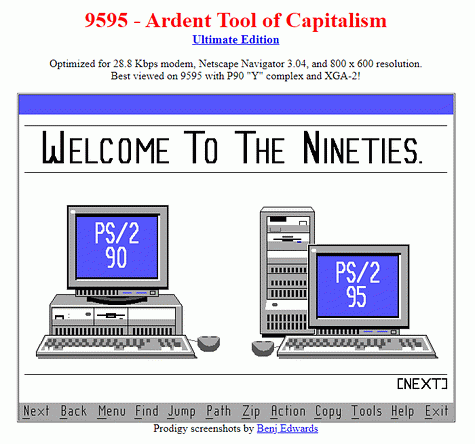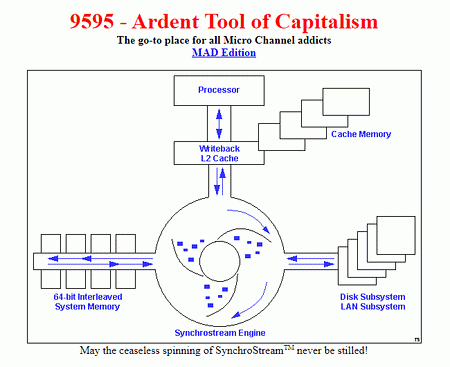|
Major Tom in late 2019 (updated 26 Dec 2023):
Well, since you are here you are probably wondering what is different or
special about this version of the Ardent Tool? Why does it even exist? Well,
let me explain...
The Past
It all started many years ago when I've first discovered Louis Ohland's
Ardent Tool of Capitalism, shortly after getting my first PS/2 machine
(Model 70 with the
Type 3 planar). I can't tell you when
exactly this was, but it would have been either late 2010 or somewhere in 2011.
Before that, I was more interested in old Compaq machines with their fancy
modular design and EISA bus. But then I discovered Big Blue's even more
interesting PS/2 line. It wasn't until a few years and PS/2s later when I've
created a simple offline copy of the Ardent Tool website and carried it with me
on the hard-drive of my laptop. Why would I need to do something like that you
ask? Well, you see, the "workshop" where most of my vintage hardware is stored
didn't have a proper internet connection back then, and with no access to
documentation and software, it's hard to work on any machine — especially
a PS/2. No refdisk? Missing ADF? You're screwed... So, having a local copy of
the website on my laptop was more than convenient. Instant access to all the
information and files — no internet access needed. Yay!

Louis' index page back in early 2012.
As I kept tinkering with the various PS/2 hardware, I would start doing
minor edits to my local copy, fixing small errors here and there, adding my own
notes, and so on. Since the pages were stored locally, edits like that were
extremely easy and quick to do. All this was nice but it still had a major
downside — with no connection to the outer world all external links were
"off-limits". And many critical files and documents were external
unfortunately. This was especially true for the older versions of the website
before Louis started "localizing" at least the most important stuff. So, over
time I would add local copies of some other major PS/2-oriented sites. And
since all this was on my hard-drive, I'd often merge this additional content
with the Ardent Tool pages. This included fixing the hyperlinks, so they would
point to the local pages and files...
I kept adding more and more content to my — now somewhat special
— copy of Louis' website. Among other things, I would throw in all the
old sites that could die at any moment, pages, and files that were already dead
but could still be recovered via archive.org (or some other means), files I
have found on old hard-drives, etc. And I didn't stop there, I would also add
my own original content too — notes, board outlines, schematics,
measurement results, etc. I have also completely reworked certain important
pages — like the main index, so I could navigate the content more
efficiently (the old index always was one huge maze for me). At this point, I
was using my local copy pretty much exclusively, even when I had access to the
net.

My modified index page in 2016.
The illustration is based on a drawing from IBM's brochure.
This was when I started thinking about giving back to the community. I felt
bad for using the pages and visiting the newsgroup, lurking, but never posting
my own observations. Sandy would probably call me a "ROM" — Read Only
Member. I thought I would simply make my copy available to everyone or send the
files to Louis, so he could merge the changes into his primary version. The
latter would be preferable over introducing yet another (and yet different)
mirror of the website. Since the internet connection situation at my workshop
got resolved a long time ago, there was no need to keep this locally on my
laptop anymore.
But there was a problem. While I knew that Louis kept adding to his website
and I would even merge some of the important additions to my copy, I didn't
realize how many changes cumulated there over the years. But I have done some
basic analysis, and after thinking about it for a while, the "scale of the
operation" actually didn't look that bad... Either I or Louis could simply diff
the entire directory tree and merge in the new and modified files — the
pages were just a plain static HTML at this point. No worries! So I have
created a fresh snapshot and tried to do the merge. The directory structure was
largely still the same, but after randomly checking some of the conflicted HTML
files, I have realized that this isn't going to work.
The problem was that the modified HTML documents differed greatly, even if
there was just one tiny change made on the entire page! This was bad news. I
already knew that some WYSIWYG editor was used to create most of the pages, but
I didn't know that its code generator was *that* unstable. I'm not gonna dive
into this topic here, but if you are interested, you can read my blurb about WYSIWYG editors. Anyway, I had basically
three options. I could give up, write a specialized software that would
automate the process, or I could go "semi-auto" and use some diff tools, simple
scripts with some of that regex magic to update my copy. No way I could simply
send the files to Louis and expect him to do all the work manually. That would
probably take months. As a programmer, I could get it down to a week or two
with the right tools. And this last option is what I have decided to go in the
end. While a fully automated merge would be really nice, it would also take
quite some time to write such a tool. Already existing tools, simple scripts,
and regular expressions can do most of the work, without spending too much time
on them, but of course, the merging process itself will be somewhat slower...
Well, so be it!
It didn't take long and I had the process streamlined fairly well. And as a
bonus, I would review most of the changes and do additional adjustments where
needed. It wasn't really as bad as I originally thought, and the merging was
done relatively quickly. Hurray, we are done! Right?

The same index page one year later (2017).
The art was animated and randomized...
Not quite. You see, since I had to manually "touch" many of the files, I've
noticed that there is plenty of space for improvement. Broken links, broken
formatting, duplicate pages, and I don't even know what else. (You can probably
see where this is going, eh?) Some files were perfectly fine, other were
"unacceptable". Before I did anything else I've created a backup copy of the
now merged and updated Ardent Tool, and started going through my long TO-DO
list. There is no reason to describe all the work that went into this, but it
was a lot — some of it fun, some of it quite tedious and not so fun, but
after some 2 months (yikes) of off and on work I was pretty much done and happy
with it. Time for another backup and then upload it all to my web server! This
was mid-2017 or there about...
The Present
It's 2019 now and the site still isn't available... so what happened?! Well,
life, other hobbies, and "stuff" happened. The timing was simply bad. Long
story short, I didn't touch the pages for about 2 years. I have spent some time
tinkering with my PS/2s to quiet down the MAD symptoms, but it was nothing
compared to the previous years.
I have finally got back to the MCA world in May 2019 and actually made some
additions to my still private (sigh) copy of The Tool. (Well, not exactly
private, for some time it was technically available online, but on a
non-standard port and no links were leading to it, so effectively it was
invisible). I have spent some time checking the newsgroup and Louis' Tool only
to realize that my copy fell behind. A lot. Again... So it was time for a
second large merge. As before it took couple weeks, and of course, I couldn't
resist throwing in some additional changes of my own. Ta-daa! It's time to make
this thing public — this time for real. Finally!

The index as it appeared when the website was first published (2019).
I've decided to revert back to the "SynchroStream Engine" illustration.
Well, I think the result of this MAD ride was worth the time I have spent on
it. I hope people will agree and find it useful as well.
The Future
The plan is to keep updating the website with new content. You can expect
more additions from me, Louis Ohland, David Beem, and many other contributors
and sources.
|